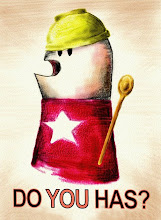“‘Why does everyone run toward a blood curdling scream?” mumbled the Senior Wrangler. “It is contrary to all sense.’”
Pithy was recently criticized for being too abstract in our writing—that we only allude to a story—that cohesion, in turn, alludes us. The irony of this situation is that Pithy would expound this event in thorough detail—painstakingly portraying the setting, characters, plot and development, even describing the vein of reluctantly melting popsicle trickling down our hand—the faintly sticky stain reminiscent of finished chores and the easily remembered moments of what it was to be young and in love with the intangible perfection of lazy summer—we would describe this all, but the involved party would prefer we left them out of it. It’s ok Mom, we will save that kind of detail for the next posting—this post is all about irony, and alas, we must keep it vague—there are those who would like nothing more than our ruin—“with great awesomeness…” So for those who can’t handle the beauty, the puzzle-fitting perfection of ironic karma, we keep it general; you know who you are—this one is for you.
Irony involves many things—the juxtaposition of unusual or seemingly contradictory opposites which, upon reexamination, display a truth not entirely without humor, often painful to a point, and always good enough to spread on toast. Humor is good and can be generated from any source, sarcasm is better—finding its roots in the instigator, coupling humor with insult, and evoking a sense of well-earned bested; irony is supreme—it surpasses the simplicity of humor and one-ups sarcasm in that the joke is made and received by the same person—there is no comeback, nobody wants to burn themselves twice. It is often said that it takes a sense of humor to make it through life relatively adjusted; this is assuredly true. However, irony guards more hearts, even than humor, for it takes a sense of irony to appreciate the joke which is on oneself. Let’s face it, there are only two reader reactions at the end of O. Henry’s story: we can look at the wife—a bald, poor, gift-buying failure—and the husband—replete with a watch-less chain and a useless comb—and laugh, acknowledging that their failures through sacrifice only deepen their love (so is it really a failure?), OR we can suggest they get divorced—the universe obviously doesn’t want them to be together. We choose the former.
Pithy’s most favorite irony episodes generally start, or at least involve, the attitude or statement, “Look what I can do.” “Look, I’m Goliath, I’m huge—look what I can do…” “We’re the British army, we’re the best army in the whole world—look what we can do…” “We built this huge boat, it’s titanic—look what it can do…” “I’ve got my whole life ahead of me; I’ll be single forever; it’ll happen to all my friends first—look what I can do…” This last one provides us with much opportunity for enjoyment and we feel it will soon join the other historically marked monuments to irony.
Our critics would caution us to be careful—that we are playing with fire. How do we dare print this? We appreciate irony. Mark our courage—look what we can do.
A Mighty Wind
1 week ago

0 comments:
Post a Comment